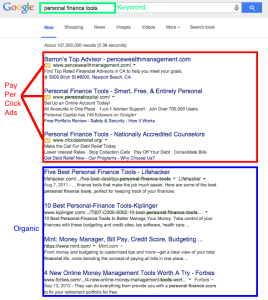Menu
September 4th, 2015
Google is the world's largest search engine, covering 67% of desktop searches and an astounding 83% of mobile. In addition to being the best website to get the answer you are looking for, it offers a plethora of services as well: Gmail, Maps, Chrome Browser, and a suite of office products — all for free. With Google reporting $17.7 billion in revenue last quarter, the question begs to be asked: How Does Google Make Money?
Enter Google AdWords — Pay-Per-Click Traffic for Advertisers
Google offers advertisers two networks (Search & Display) on which advertisers compete for traffic. The Google Search Network is by far the biggest; it sells ad slots for keyword searches on Google.com, in effect selling real estate on the search engine results page.
These ad slots can show up in different formats, with the most common set-up being 3 ads on top and 7 down the right side. When — and only when — a customer clicks on an ad, the advertiser is charged. This allows Google to gain the advertiser's confidence by only having them pay for direct traffic to their website.
How Does Google Know When to Show My Ad?
Behind the scenes at AdWords, Google gives you immense control over your entire account. Campaigns are broken down into Ad Groups, which are sets of keywords and ads. When a customer searches for a keyword in your Ad Group, it pulls a related ad. In that way, you are able to focus your ad copy to be relevant to the keywords.
For example you might pair a list of keywords or phrases such as "personal finance software," "money management software," and "budgeting software" with ads that discuss the special benefits of your software. Keywords such as "personal finance help" would be paired with ads that discussed your one-on-one products.
At the keyword level, you are able bid on the amount per click that you are willing to pay for each keyword, controlling in detail what searches you want to show ads for.
In addition, you are able to control the monthly budget, geographic location, type of user device, and even the times your ads will show in order to optimize your offering.
And What About the Order of the Ads on the Page?
Let's turn to Google directly to get an insightful view of how the Google AdRank Process works.
Google knows that it has to bring quality clients to your website in order to keep your business. It also has to deliver highly relevant ads from top quality businesses to searchers to build trust and generate more clicks, bringing Google additional revenue. This video shows how Google balances the interests of the three parties — Google, Your Firm and The End User.
This is great news for all legitimate advertisers, because it means that a higher quality score gives you an upper edge on those with bigger budgets. According to Wordstream, a quality score of 10 gives you a 50% discount over the Google benchmark of 5. So even though your competitors might be throwing more money into the system, careful attention to your quality score can earn you more clicks and ensure your ad is showing high on the search results page.
Should My Firm Use Google's PPC Network?
With Google's organic space on the search results page shrinking, PPC has become an increasingly viable option for attorneys looking to generate phone calls and leads to their firms. With new features such as Call-Only campaigns (bidding on only trackable calls to your firm — the best type of lead) and the ability to control the exact search engine placements for your website, PPC can be great option to add to your diversified marketing plan.
Before starting any campaign, make sure to ask yourself some important questions:
- What is my Unique Selling Proposition that will encourage customers to click on my firm as opposed to the other ads on the page? With so many ads limited by state bar rules, what truly sets your firm apart?
- What is my marketing budget and expected cost per lead? These numbers will assist you select bids for keywords and your overall account budget.
- Is my firm prepared for a surge in calls and requests from my firm? Since you are paying for this traffic, you want to ensure that everything from your website to your phone processes are ready to impress every client.
- What practice areas are most profitable and what keywords should I target? Generic terms such as "attorney" tend to be less useful than "Ann Arbor Mediation Attorney."
Bottom line. Using Google AdWords to instantaneously drive traffic to your site — and calls to your firm — is an exciting option to add to your marketing profile. It's very powerful in bringing in qualified traffic, but can quickly spiral out of control if not set up properly. Implementing PPC best practices, utilizing all of the extensions and tools that Google offers, and closely monitoring and optimizing your account will make the difference between a successful campaign and a money drain.
The Modern Firm helps law firms create and optimize their PPC campaigns, taking care of everything from account structure to ad creation to optimization. For help establishing your AdWords account and assistance in answering the questions above, contact marketing@themodernfirm.
Categories: Question of the Week
Tags: Google





